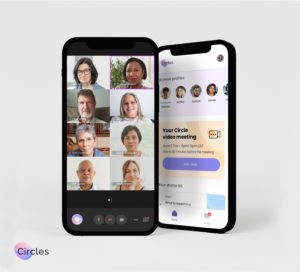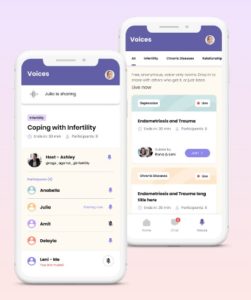It’s no secret that being a part of the chronic illness and/or rare disease community can sometimes be lonely and isolating. Many people, while empathetic to the challenges faced within this community, do not fully understand it. That is one of the reasons why Irad Eichler and Dan Landa launched Circles in 2020. Circles – a revolutionary, subscription-based online support platform – offers people the chance to engage in small online groups of people dealing with similar experiences, guided by mental health professionals, to garner support and care. This platform offers weekly video sessions, 24/7 text chats, self-help exercises, blogs, webinars, and more for a small monthly fee.
To increase accessibility and provide support on a greater scale, Circles recently launched a new FREE service called Voices. On July 21st, 2022, Voices was introduced to the public. Operating through the Circles app – which can be downloaded through Google Play or the Apple store – Voices offers free, anonymous, voice-only support rooms.
Recently, I sat down with co-founder and CEO Irad Eichler to learn more about both Circles and Voices, why he is so passionate about helping the chronic illness community, and the best ways to help this community combat loneliness.
About Irad Eichler
Growing up, Irad moved around in Israel a fair bit. This taught him not only about how difficult loneliness could be to deal with, but also about how important it is to have a strong and supportive group of friends. Eventually, Irad pursued his degree in Anthropology for Bar-Ilan University, and later went on to receive an Executive Certificate in Public Leadership from Harvard Business School, as well as an MBA in Business Management from the College of Management.
In 2008, Irad was named World Economic Forum’s “Social Entrepreneur of the Year.” Prior to founding Circles, Irad founded Shekulo Tov, a nonprofit organization which specializes in providing occupational rehabilitation services for people with disabilities. This inclusive organization is now one of the largest in Israel, and places over 2,000 people with disabilities into the job market each year. As Irad explains:
“I really care about social problems and I’m trying to solve these problems in a sustainable way through a scalable business model.”
Currently, Irad and his family live in a Kibbutz, an intentional community which provides support, nurturing, and care to everyone living in it. As Irad explains:
“It’s a support system. So I practice what I preach. The Kibbutz really represents the ideals I want to see in Circles, and now in Voices: community strength and emotional uplifting for people who are dealing with challenges.”
Circles: An Overview
When you’re dealing with something tough in your life, it makes sense to want to speak with others who have gone through the same experience. But what if nobody you know has dealt with divorce, or PTSD following military service, or chronic illness?
Circles aims to overcome these barriers, meeting people where they’re at to provide mental and emotional support. Up to ten people facing similar life challenges are paired within a group. Each week, people meet virtually to discuss. The sessions are professionally guided by a certified and vetted mental health instructor. Ultimately, the goal of Circles is to help people not only heal from trauma and struggles that they have faced, but to cultivate meaningful community bonds.
In 2021, VeryWell Mind awarded Circles for being the Best Platform for Group Therapy.
Why Launch This Platform?
After Irad’s mother was diagnosed with cancer, he noticed that she struggled with something on her journey: loneliness. Even though they spent a lot of time together, Irad explains:
“She said that she was lonely and I didn’t really understand it. It wasn’t something that I was able to help her with since I hadn’t gone through what she was going through. One day, I heard her speaking with another friend who had cancer and my mother was vivid, alive, and happy. When my mother passed away, I also sought out support from friends and people who had lost a parent. It’s really common, when you’re going through a stressful time, to feel like you’re not the only one dealing with it. People feel shame and guilt, and sometimes that can be hard to share.”
When Irad realized how challenging loneliness could be, and how pervasive the issue was, he decided to launch a Whatsapp group for people to chat. As he invited people into the group, he felt overwhelmed by the number of people dealing with issues such as loneliness, chronic illness, and chronic pain. He shares:
“As more people shared their stories, I realized that the need was there for this type of open communication. Everyone deals with challenges, but the mental relief of finding support can help accelerate the physical relief as well. It solidified to me that my life’s mission is to ensure that nobody will ever be left alone while dealing with a life challenge.”
At the same time that he was running the Whatsapp group, Irad recognized some of the issues associated with social media platforms. While there are a number of Facebook groups for those with rare diseases and chronic illness, he felt that these didn’t provide the human connection that people needed:
“Even though you can answer in writing in these groups, you don’t get to see, discuss with, hear, or connect with each other.”
So far, Circles has tens of thousands of users. But as Irad and his team developed the platform, they noticed that there were still a few barriers to access, including financial barriers. After brainstorming, they decided to use some of their recent $16.5M in Series A financing to expand their platform and offer Voices, a free platform to overcome these barriers which prevent support for those in need, and for whom traditional talk therapy might not be an option.
Voices: A New Offering
Voices was developed as an anonymous drop-in, voice-only platform for people searching for support. In its anonymity, people can safely and powerfully speak about their experiences via voice chat. As Irad explains:
“Voices is a feature on Circles, and can be accessed by going to the app and clicking on the free Voices tab. We’re all about group therapy and lowering the bar to give and get support, and Voices takes this one step further by making it completely free. Voices is peer-led by people with lived experience.”
Voices launched with 100 initial partners and rooms comprising of over 30 different topics. Some of the topics discussed in the chronic illness rooms include:
- Medical gaslighting
- General chronic illness
- Type 1 diabetes
- Endometriosis
- HIV/AIDS
- Medical trauma
- Prolonged hospital admissions
- How to deal with reactions from friends and family
- Self-advocacy
Each room is led by moderators who have lived experience in the room(s) they are running. Irad explains that this is so important because the moderators really need to understand who they’re speaking to and what everyone is going through. Says Irad:
“At its core, Voices is a community of people doing good for other people, and those people who are helping others are also helping each other. It’s amazing living in an era where so many people are looking to help others. The guides for each room are vetted, trained, and provided ongoing support from professional facilitators. We hope that more people sign on to become a guide so that we can expand the circle of empowerment.”
The moderators and guides are able to set up a group at their convenience. People then follow the guides and receive notification every time a room opens and becomes live. As Voices grows, the more rooms will be available, and the more immediate support people will have. Users are also not committed to solely one room or guide; they can join a room with a specific guide each day or week and have ongoing conversations, but also join other rooms if that particular guide isn’t active.
Seeing the Benefits of Voices
Since its launch, Voices already has thousands of users enjoying the benefits of real-time human connection and communication. Irad believes that this is one of the most rewarding parts of the entire platform:
“There are, of course, many challenges when building a company or platform. But when I go into a Voices room, I immediately see what we’re doing and how well it’s working. The most meaningful moments come from hearing the people who are getting value from Voices. We are partnering with a number of nonprofits and people who are building rooms for different indications, like Growing Veterans creating spaces for veterans. Seeing the impact really drives home that you don’t have to be alone while dealing with a life challenge.”
Outside of seeing how people interact on the platform, Irad explains that the second most rewarding part about building Voices is working with his team. He shares:
“I feel so humbled to work with people who are so mission-driven and enthusiastic about solving this challenge. There’s a story around each team member, and I really believe that everyone is in the right place to serve our users, understand what they’re going through, and attack the challenge of loneliness.”
In the end, Irad is extremely proud of his team for helping to create a more empathetic and interconnected world, and is extremely thankful for everything that they do.
Moving forward, Voices aims to provide a space for everyone in need. And who knows – you may just see Patient Worthy running a chat on Voices soon!








